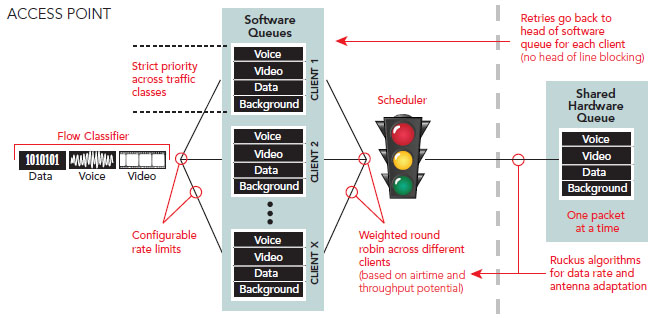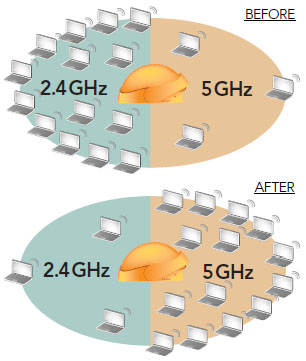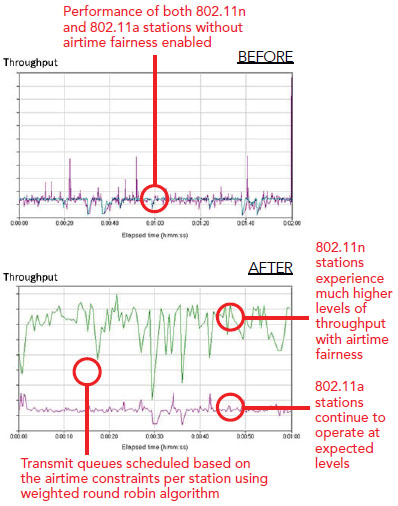
SmartCast
Ensuring the Best Video Quality-And Enabling Wireless IPTV.
Our patent-pending SmartCast technology combines innovative multicast traffic handling techniques, smart QoS, and application-aware traffic classification capabilities, for top-quality Wi-Fi video transmissions. SmartCast differentiates and manages multicast video frames separately from all other traffic types, for robust wireless transport for IPTV streams.
When SmartCast detects a wireless client subscribing to a multicast streaming application, such as IPTV or a VOIP call, it directs the associated multicast packets to each subscriber, using the optimum data rate and signal path. To ensure peak performance, all packets are queued/de-queued by specialized schedulers, optimized for the corresponding traffic type, the delay/jitter tolerance and bandwidth requirements of the traffic, and the changing characteristics of each station on the WLAN.
SmartCast features:
- Multimedia-optimized traffic management algorithms, which guarantee performance for multiple broadcast quality voice or video streams, while maintaining adequate bandwidth for data applications
- Automatic classification of all traffic, based on UDP/TCP port and other application attributes, and managed according to the traffic's classified priority and characteristics
- Automatic Type-of-Service (TOS) tagging, which eliminates complex QoS configurations, with automatic management of lower-speed 802.11 devices, to assure bandwidth availability for prioritized video applications
- Four priority queues per station, for high prioritization granularity and precision for multiple concurrent multicast streams
Multimedia optimized traffic management algorithms guarantee performance for multiple broadcast quality video streams while maintaining adequate bandwidth for data applications. SmartCast automatically classifies all traffic based on UDP/TCP port and other application attributes, and manages each traffic type (voice, video, data) according to its classified priority and characteristics. Automatic Type-of-Service (TOS) tagging eliminates complex QoS configurations, while automatic management of lower-speed 802.11b devices assures bandwidth availability for prioritized video applications. Four priority queues per-station result in high prioritization granularity and precision for multiple concurrent video streams. All packets are queued/de-queued by specialized schedulers optimized for the corresponding traffic type. Each scheduler takes into account the delay/jitter tolerance and bandwidth requirements of the traffic and the changing performance characteristics of each station on the WLAN to ensure the best end-user experience.
Smart traffic management maximizes reliability and wireless performance
SmartCast is a sophisticated quality of service (QoS) engine specifi cally developed to maximize the reliability and performance of delay-sensitive applications, such as IP-based voice and video over 802.11 networks.
Based on patented technology, SmartCast delivers a collection of unique capabilities - such as packet inspection, automatic traffi c classifi cation, advanced queuing and scheduling.
Unlike any other 802.11 system, RUCKUS SmartCast algorithms automatically schedule and pre-queue traffi c in software on a per client basis. This enables more advanced classifi cation and scheduling that can be applied for each client on a per-traffi c-class basis. SmartCast is a superset of the IEEE 802.11e/WMM hardwarebased queuing standard, ensuring uncompromised performance while remaining standards-compliant.
With per-client queuing, SmartCast is ideal for video and voice over Wi-Fi applications because it ensures disruptive clients don't negatively effect the performance of others clients on the network (no head-of-line blocking).
The SmartCast engine further optimizes spectrum usage with innovative band steering and airtime fairness technologies. Essential in high-density and diverse client environments such as conference facilities, classrooms and auditoriums, SmartCast works in concert with RUCKUS BeamFlex smart antenna array technology to deliver greater network throughput and more predictable performance for latency-sensitive applications.
SmartCast uses patented multicast traffi c handling to guarantee high-defi nition video streaming over Wi-Fi. Proven in millions of subscriber homes around the world, providers are using SmartCast to deliver multiple concurrent broadcast quality video streams to subscribers without having to wire or rewire homes or offi ces.
SmartCast was designed for simplicity, requiring no manual tuning or confi guration. SmartCast automatically classifi es traffi c based on Layer 2 or 3 priority tags and performs and advanced heuristic analysis on untagged traffic.

SmartCast Queuing and Scheduling
Benefits:
- Powerful - Sophisticated, application-aware classifi cation engine, per-client scheduling and prioritization for WLANs provides precision bandwidth management, traffi c shaping and service level agreements for video, voice and data.
- Superior Performance - Eliminates jitter and delay for video and voice, providing quality of service and outstanding user experience.
- Guaranteed multicast streaming - The only proven QoS system for IPTV, SmartCast converts multicast traffic to unicast, delivering video traffic to each subscriber at the highest data rate that the client is capable of supporting.
- Optimal utilization - Airtime fairness provides effi cient use of the available spectrum, resulting in greater network capacity in high-density and diverse client environments.
- Increased efficiency and capacity - Band steering directs dual band clients to the less congested 5 GHz spectrum, while load balancing directs clients to less congested APs, distributing client load across all available channels and APs.
- Easy to use - Smart heuristic-based classification automatically provisions QoS services.
Auto Traffic Inspection, Classification and Queuing
At the heart of SmartCast is a sophisticated traffi c inspection, classification, and optimization engine that works in software to provide per-client, per-traffic-class queuing.
The SmartCast QoS engine inspects each packet and automatically classifi es it into one of four queues - voice, video, best effort, and background. SmartCast can inspect a variety of headers including those of Ethernet frames (both TCP and UDP), VLAN tags, and IPv4 and IPv6 packets.
If the type of service or 802.1p priority fi eld is used, SmartCast maps packets to an equivalent internal fi eld. If no tag is provided, SmartCast employs heuristics to classify traffic.
Once classified and queued, traffic is scheduled using a weighted round robin method based on airtime and throughput potential as well as prioritization defined for the WLANs. Rate limits can also be applied on a per-WLAN basis for every client.
Once SmartCast classifi es, schedules and queues traffic, RUCKUS' patented BeamFlex smart antenna array then takes over. BeamFlex is a miniaturized intelligent phase array antenna system that constantly steers traffi c over the best performance signal paths and away from interference to minimize packet loss and maximize throughput.
Always looking for patterns in the packet flow, SmartCast is automatically enabled on every AP - no configuration is necessary.
Patented Multicast Voice and Video Support
When transported over 802.11 networks, multicast transmissions typically use a best-effort technique that requires no acknowledgement from the receiving devices.
To ensure the delivery of multicast and broadcast traffi c, often used in voice and video applications, SmartCast employs a patented multicast technique that converts multicast to unicast packets.
Converting multicast to unicast traffi c enables the use of 802.11 acknowledgements to ensure transmissions are forwarded at the highest possible data rate and are properly received.
Receipt acknowledgement provides the guaranteed delivery necessary for streaming broadcast quality video over wireless. Through IGMP snooping, all APs and mesh nodes are aware of multicast group membership tables, ensuring consistent service anywhere in the wireless network.
Increased Efficiency and Capacity with Load Balancing and Band Steering
SmartCast employs sophisticated load balancing and band steering techniques to enable clients to efficiently use the AP and spectrum resources.
RUCKUS ZoneDirector monitors the client load across the APs, and drives new clients to less congested APs. Requiring no specialized software on the client, ZoneDirector, not the client, is in control of how they join amongst available APs, resulting in a more prescribed distribution. ZoneDirector automatically groups APs to balance across - there's no need for manual confi guration. Operating on a per WLAN basis, load balancing can be selectively disabled, for instance disabling on Voice WLANs only to ensure seamless roaming.
Available on RUCKUS ZoneFlex dual-band APs, band steering automatically "steers" clients to the 5GHz band, maximizing the use of spectrum resource to ensure higher availability and throughput for users.
This is ideal for high-density client environments such as auditoriums, conference halls and public venues where many users try to concurrently connect to the WLAN.
With only 3 non-overlapping channels within the 2.4GHz band, it is preferable, when possible, to automatically steer dual-band clients to the 5GHz band where 23 non-overlapping channels are available.
For dual-band clients with a poor signal to the 5 GHz radio, the 2.4 GHz band would used instead. This results in a more optimal distribution of traffi c across available channels and a better use of the available air resources. Performance is further improved because there are fewer users sharing (and colliding) on a given channel.
More Efficient Use of Spectrum with Airtime Fairness
Airtime fairness is an advanced scheduling technique that ensures legacy Wi-Fi clients as well as under performing 802.11n clients don't slow down the performance of faster 802.11n clients by taking too long to transmit.
With airtime fairness enabled, transmit queues are scheduled based on the airtime constraints per station using weighted round robin algorithm.
With airtime fairness, users have an equal time on the air and can continue to send packets so long as their airtime use allows. This allows clients with faster potential throughput to recapture the advantages of their higher rate potential and increases overall network capacity.
Features:
- Traffi c queuing on a per client basis (voice, video, best-effort, background)
- Automatic (heuristics-based) traffic classifi cation
- 802.11e/WMM support
- TOS and 802.1p classifi cation
- Airtime fairness
- Band steering
- Rate limiting
- WLAN prioritization*
- Client load balancing*
- Power save (UAPSD and Legacy)
- IP multicast-to-unicast conversion
- IGMP snooping
*with ZoneDirector
Before and After:
Band Steering in Action

- Ideal for high-capacity environments
- Automatically steers clients to 5GHz
- Takes into consideration RSSI levels across both bands
- Supported in RUCKUS dual-band APs
The Impact of Airtime Fairness

Documentation:
Download the RUCKUS SmartCast Datasheet (PDF).

